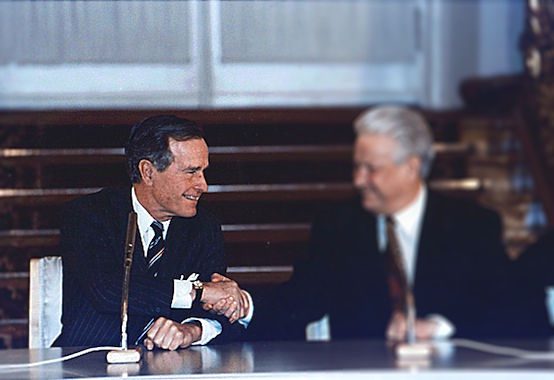The Modern GOP and George H.W. Bush’s Internationalism

The New York Times reviews the Republican candidates’ foreign policy pitches. I was struck by this passage in Sanger’s report:
In speeches, town-hall-style meetings and interviews, many align themselves with the spirit (but not the arms control agreements) of President Ronald Reagan, knowing it is a sure pathway to applause. Except for his son Jeb, they usually avoid talking about the first President George Bush, now considered, despite his victory in the Persian Gulf war, as far too internationalist for current Republican tastes [bold mine-DL].
I understand what Sanger is trying to say here, but a better way to understand this is that Republican hawks avoid mentioning the elder Bush’s record primarily because they regard his internationalism as insufficiently aggressive and not meddlesome enough. They prefer their “internationalism” to be heavy on intervention, bluster, and hectoring with as little diplomatic engagement and multilateral cooperation as possible. In their view, the elder Bush is a bad example to follow because he put too much pressure on Israel (which was barely any at all), was too cautious in his response at the end of the Cold War, didn’t ostracize China enough after 1989, didn’t plunge headlong into the Balkan wars, and didn’t march on Baghdad. In other words, they reject much of what the elder Bush got right as president, and in the second Bush presidency the party’s hard-liners sought to do the opposite of what the elder Bush likely would have done under similar circumstances.
It is also not a coincidence that a field of candidates with virtually no foreign policy experience is unwilling to refer to the one recent Republican nominee that already had some before being elected. Invoking Reagan is better for candidates with no foreign policy experience, while calling the elder Bush to mind will highlight just how unprepared they are. In addition to all this, the elder Bush came from the relatively moderate wing of the party, so one scores no points with movement conservative activists by referring to him. Besides, praising his record on foreign policy would require the candidates to acknowledge that the party’s hard-liners can be and have been wrong on important questions in the past, and that will hardly help them as they call for hard-line policies today.
The neglect of the elder Bush in Republican rhetoric on foreign policy is nonetheless remarkable. Bush’s foreign policy record was by far the most successful of the last thirty-five years, and it was certainly far less harmful than his son’s administration. If a Republican candidate wanted to show voters that he intends to conduct a competent and successful foreign policy, the example he would cite is that of the elder Bush, but because Bush and his advisers are now perceived as too realist that never happens. Indeed, because the second Bush presidency has made the first seem even more competent and effective than it was, the party’s hawks don’t want to mention the latter because it reminds everyone of their own terrible judgment.
Comments